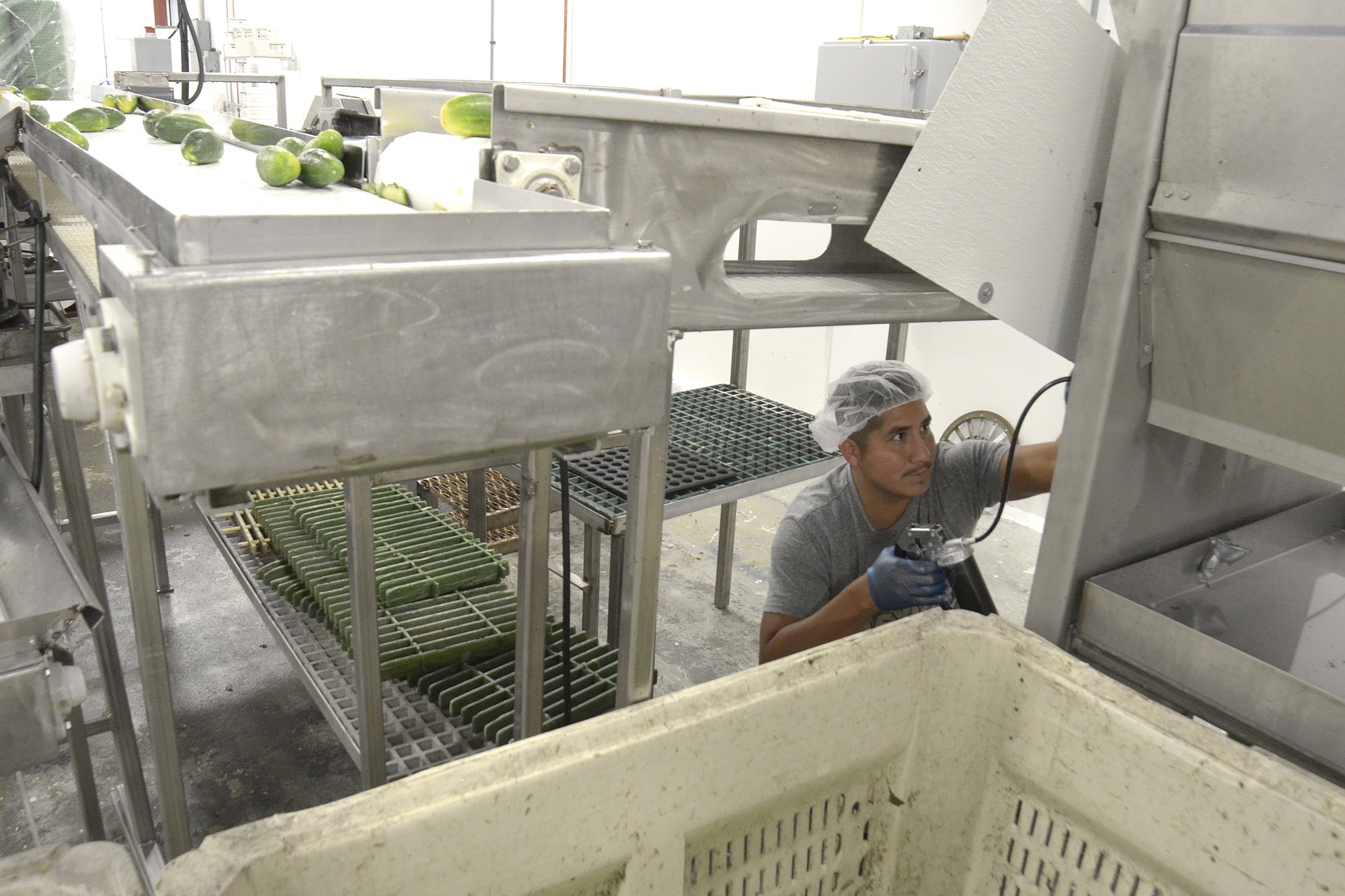BURLINGTON — Pickles and sauerkraut are once again rolling down processing lines in Skagit County as Gielow Pickles recently started up production in a 70,000-square-foot facility at the Port of Skagit.
The plant joins Sakuma Bros. Farms as the only Skagit County-based crop processors and will help salvage valuable rotation crops of cucumbers and cabbage, said Don McMoran, director of the Washington State University Skagit County Extension.
“Processors allow the farmer to just be the farmer, while they do processing, packaging, sales and distribution,” McMoran said. “They help middle-size farms more than anything. We have smaller, niche farmers. We have more larger farms getting larger. What we don’t have is a strong midsize farming class.”
This year’s production will be relatively small in Gielow Pickles’ startup year and will process roughly 92 acres’ worth of fresh cucumbers and 18 acres of harvested cabbage, said Scott Peterson, the port’s director of business development and real estate.
But Peterson said production will grow as farmers can secure contracts and plant fields next year.
“We think we’ll get back to producing a good amount of local product,” he said.
The plant currently produces pickle chips, spears, whole pickles, sauerkraut and pickled cauliflower, but Peterson said the Gielow family plans to install more processing lines. Plant supervisor Aide Torres said a processing line for relish is planned for the future.
Products are packaged in 5-gallon buckets or larger jugs, as Peterson said the Gielow business model is based on selling to restaurants and food service companies.
Gielow Pickles is a family-owned producer of pickles, sauerkraut, peppers and relish. The company lost a bid to buy Mount Vernon pickle manufacturer Pleasant Valley Farms out of bankruptcy last year.
The company has headquarters and a manufacturing facility in Michigan and eight agricultural facilities across the U.S. and Mexico, according to its website, gielowpickles.com.
The port invested $600,000 to prepare the building — empty after being leased by Triton Aerospace — for its new tenant, Peterson said. Retrofits included installing wastewater collection that keeps solids and overly acidic water out of the Burlington sewer system, new doors, setting up utilities and refrigerating roughly 14,800 square feet of floor space.
Gielow supplied labor for improvements through local contractors and will provide farmers with seed and machinery to harvest the crops. In some cases, Gielow will plant the seed and cultivate fields as well, Peterson said.
After the “fresh fruit” is processed, Peterson said 70 large fermentation tanks adjacent to the former Pleasant Valley Farms pickle plant site on Dodge Valley Road in Mount Vernon will provide additional product throughout the year.
Full-time employment at the plant is currently 19, while another 20 workers are employed at the tank farm.
The port worked with Gielow to set up a temporary processing plant last December at the La Conner Marina, which was able to salvage around 30 percent of the county’s cabbage crop after harvest.
Rotation crop
Aside from the production and employment generated at the plant, McMoran said the return of a processor will help support the region’s overall agricultural economy by re-establishing cucumbers and cabbage as rotation crops.
Cucumbers and cabbage bring in more money as a rotation crop than wheat sold as a commodity or grass, which has little value, but McMoran said they’re tough to sell without a processor issuing annual contracts. He said the crops are also good at breaking plant disease cycles in fields where they are grown.
Production of cucumbers peaked in Skagit County in 2000 when 2,396 acres were planted, McMoran said, when farmers could sell to numerous regional processors.
Acreage hovered around 1,000 when Pleasant Valley Farms in Mount Vernon was the lone processor, but the farm went out of business last year, and McMoran said only around 200 acres of cucumbers were grown this year.
He said Bellingham Frozen Foods, the last local pea processor, left the valley in 2010, ending a long history of peas grown as a viable rotation crop in the county.
Large companies are especially good at marketing agricultural products across ever-expanding markets across the country and around the world, McMoran said.
Seeing a processor return to the county after watching them leave for generations has also encouraged the local agricultural community, McMoran said.
“It’s a step in the right direction, and a morale boost. We’ve been seeing processors walk away. They can leave, but we can also bring them back. That’s a moral victory,” McMoran said.



